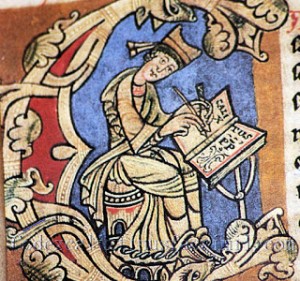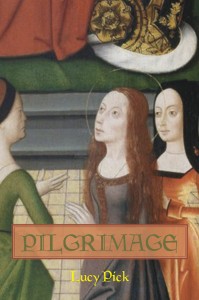 Every book is the product of a kajillion (give or take a gazillion) little twinkles of inspiration, intuition, or insight, but those key lightbulb-above-the-head moments, when you look up from whatever you were doing and know you have a story to tell are much more precious and rare.
Every book is the product of a kajillion (give or take a gazillion) little twinkles of inspiration, intuition, or insight, but those key lightbulb-above-the-head moments, when you look up from whatever you were doing and know you have a story to tell are much more precious and rare.
PILGRIMAGE was the produce of two questions that combined into one lightbulb moment in the year or so after my son was born, when I was on a postdoctoral fellowship. This was back in ancient times, before the World Wide Web, Facebook, and Google. I used to spend my spare time connecting with other medievalists on those newfangled specialist listservs. One of my favourites had a “saint of the day” feature with a little biography, and one July 6th, the story was all about Saint Godeleva, patron of battered wives, whose Flemish husband had her murdered at the end of the eleventh century. The biography also recounted a late legend about Godeleva — that her husband had gone off on crusade to expiate his crime, and that he also had a daughter who was blind. What would it feel like, I wondered, to have a saint for a mother, who cured everyone except for you? That was my first question.
The second came from a manuscript, the Codex Calixtinus, to be precise. You can see an initial from the manuscript, showing Pope Calixtus II purportedly writing a section of the manuscript, at the top of this post. This manuscript contains a colophon, that describes the origin of the manuscript in an unusual way. It reads:
The Poitevin Aimery Picaud of Partheney-le-Vieux and Oliver d’Asquins and their friend Gebirga of Flanders gave this book to Saint James of Galicia for the redemption of their souls.
Now, figuring out the authorship of this volume is highly complicated because those who actually wrote the texts in it took care to attribute them to more important people, like Pope Calixtus, above. Our best guess is that it had several authors, and Aimery Picaud, whoever he was, was its compiler. Who then was Gebirga of Flanders, and how did an unknown woman become important enough to have her name mentioned in this work with its lofty pretensions?
That was my second question. And then, the light went on — Gebirga of Flanders became the blind daughter of Saint Godeleva, and I knew I had a story.
 At last! My historical novel about the pilgrimage road to Compostela in Spain in the 12th century was released on Monday. I’ve been telling people all over the internet about it, and even added a page here, but this is my first chance to do a full blog post. So I have a whole bunch of links for you.
At last! My historical novel about the pilgrimage road to Compostela in Spain in the 12th century was released on Monday. I’ve been telling people all over the internet about it, and even added a page here, but this is my first chance to do a full blog post. So I have a whole bunch of links for you.
